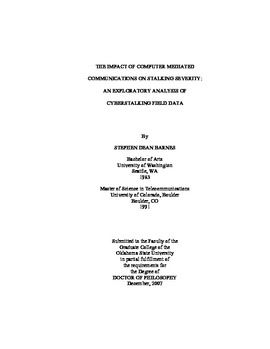| dc.contributor.advisor | Wilson, Rick L. | |
| dc.contributor.author | Barnes, Stephen Dean | |
| dc.date.accessioned | 2013-11-26T08:25:28Z | |
| dc.date.available | 2013-11-26T08:25:28Z | |
| dc.date.issued | 2007-12 | |
| dc.identifier.uri | https://hdl.handle.net/11244/6792 | |
| dc.description.abstract | Scope and Method of Study: The interaction between disjunctive interpersonal relationships, those where the parties disagree on the goals of the relationship, and the use of computer mediated communications (CMC) channels is a relatively unexplored domain. Bargh (2002) suggests that use of CMC channels can amplify the development of interpersonal relationships, and notes that the effect is not constant across communication activities. This dissertation reports on a line of research that explores the interaction between CMC and stalking, a common form of disjunctive relationship. CMC channels can be characterized by their richness, interactivity, and distribution (Te'eni 2001). Field data from cyberstalking cases is used to examine the effects of CMC channels on stalking case severity, and to explore the relative impacts of CMC channel characteristics on such cases. | |
| dc.description.abstract | Findings and Conclusions: To accomplish this, a ratio-scaled measure of stalking case severity is developed for exploring the relationship between case severity and CMC media characteristics. This includes levels of anonymity, as well as the prior relationship between the stalker and the victim. Results show that channel richness and the nature of the prior relationship dominate the impact on cyberstalking case severity, while channel interactivity, distribution, and harasser anonymity do not affect case severity. In conclusion, this analysis of cyberstalking data provides support for Te'eni's (2001) CAMOC model and its interpretation of media richness theory. Further, the analysis provides evidence that disjunctive online relationships are different from disjunctive offline relationships only when intimacy is involved. Follow-up research is proposed along with suggestions for the development of an improved measure of case severity. | |
| dc.format | application/pdf | |
| dc.language | en_US | |
| dc.rights | Copyright is held by the author who has granted the Oklahoma State University Library the non-exclusive right to share this material in its institutional repository. Contact Digital Library Services at lib-dls@okstate.edu or 405-744-9161 for the permission policy on the use, reproduction or distribution of this material. | |
| dc.title | Impact of computer mediated communications on stalking severity: An exploratory analysis of cyberstalking field data | |
| dc.contributor.committeeMember | Biros, David | |
| dc.contributor.committeeMember | Weiser, Mark | |
| dc.contributor.committeeMember | Cross, John | |
| osu.filename | Barnes_okstate_0664D_2471.pdf | |
| osu.accesstype | Open Access | |
| dc.type.genre | Dissertation | |
| dc.type.material | Text | |
| dc.subject.keywords | cyberstalking | |
| dc.subject.keywords | computer mediated communication | |
| dc.subject.keywords | media richness theory | |
| dc.subject.keywords | disjunctive relationships | |
| dc.subject.keywords | online harassme | |
| thesis.degree.discipline | Management Science and Information Systems | |
| thesis.degree.grantor | Oklahoma State University | |
